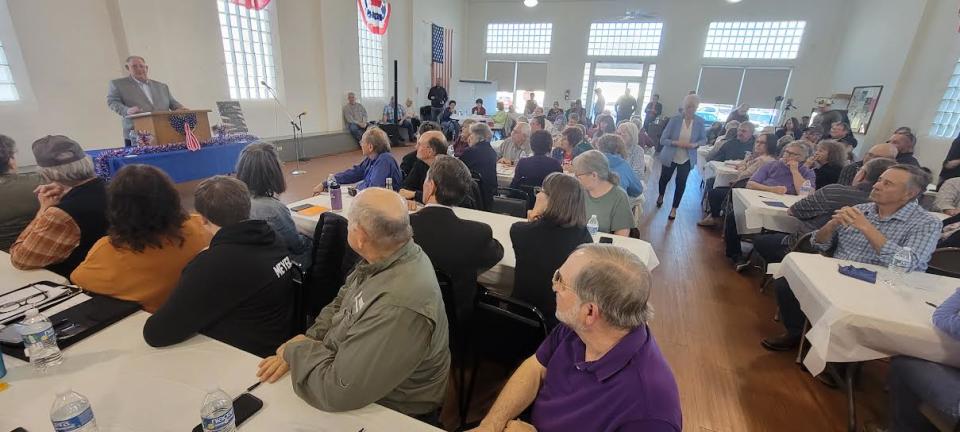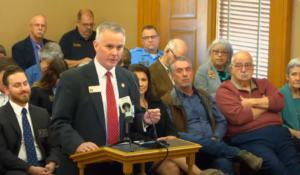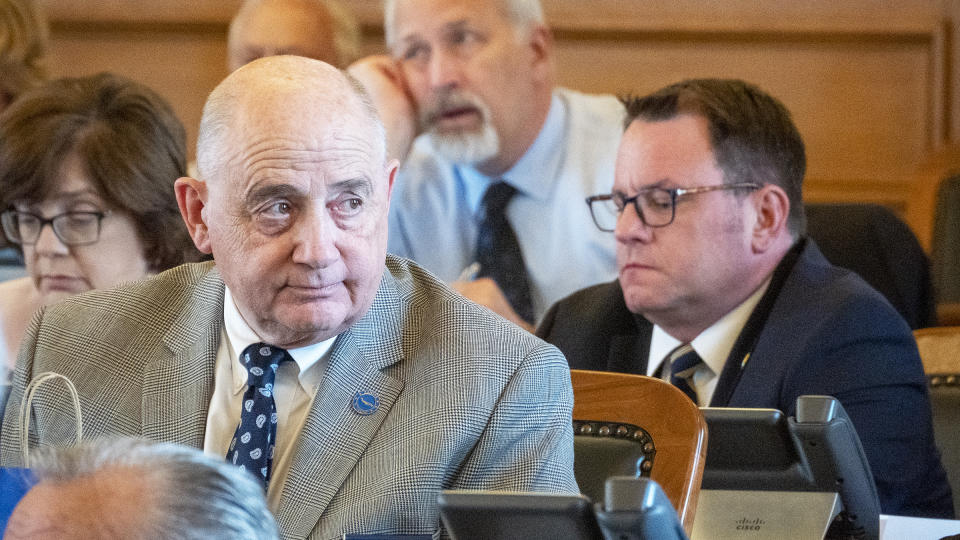Kansas GOP leaders follow Bannon’s advice for manipulating media: ‘Flood the zone with s***’

- Oops!Something went wrong.Please try again later.
- Oops!Something went wrong.Please try again later.
Steve Bannon and Kris Kobach speak at a “We Build the Wall” event on March 14, 2019, in Cobo, Michigan. (Ken Coleman/Michigan Advance)
If you tracked this year’s session of the Kansas Legislature and ended up with a headache, don’t worry.
Republican leaders in the House and Senate meant for that to happen.
Throughout 2024, they followed the advice of once and future Donald Trump henchman Steve Bannon. The perpetually rumpled Bannon told author Michael Lewis back in 2018 that “the Democrats don’t matter. The real opposition is the media. And the way to deal with them is to flood the zone with s***.”
To put it less profanely, he recommended achieving policy goals by generating a mass of low-quality news stories, controversies and arguments, which would distract reporters intent on separating fact from fiction. In the background, White House officials and their allies could then work toward their nefarious goals unimpeded.
In matters large and small, Kansas GOP politicians have adopted the same approach.
They generate outrage with bills attacking women’s reproductive rights and transgender children. Meanwhile, they pursue tax cuts for the richest Kansans. They have perfunctorily rejected wildly popular policies such as Medicaid expansion and marijuana legalization — not with well-reasoned arguments but with reams of self-contradictory rhetoric, wasting the time of those refuting it. And as they bamboozle the people of Kansas, they do so with pious expressions and condescending words for those who question their motives.
Anyone can see it, guys. You’re not fooling us. You’re flooding the zone with sewage and expecting thanks, when you should be in here cleaning it up.
You can look back at that six-year-old Bannon quote and wonder whether he was justifying chaos rather than articulating strategy. It doesn’t matter, though. In pursuing and embracing an approach that makes truth all but impossible to define, Kansas legislative leaders have done their state a grievous wrong.
Let’s look at how they did it.
A capacity crowd filled the Plainville Township Hall to hear House Speaker Dan Hawkins talk about Medicaid expansion on April 11, 2024. (Dale Hogg for Kansas Reflector)
Bad faith
House Speaker Dan Hawkins, R-Wichita, made his case against Medicaid expansion on April 11 in Plainville. Let’s run down some of his preposterous claims, as recounted in the Kansas Reflector story from Dale Hogg.
Hawkins told the audience that doctors and others working in Kansas health care opposed expanding the program.
He called the proposed work requirements in Gov. Laura Kelly’s expansion proposal “a joke.”
He said that “workforce participation will decline” under expansion and that it would encourage people not to work.
He said some of the people who would benefit are already eligible for other coverage and would be switched from private to government programs.
He disputed the idea that hospitals would benefit from expansion because of Medicaid reimbursement rates.
He claimed that Kansas has to decide between expansion on one hand and quality roads and schools on the other.
“You should say no because you are the ones who are going to have to pay for it,” he informed the crowd.
You might expect that at this point I’m going to dismantle this array of weak and discredited nonsense. For instance, doctors and hospitals obviously support expansion. Being eligible for health care coverage doesn’t mean you can afford it. Most people who would qualify for the program already work. Kansas has more than enough cash on hand to expand and then some.
But I’m not going to dig into fact-checking right now. You can look through Kansas Reflector archives and find stories explaining why and how Hawkins is mistaken. I’m not addressing the substance of his remarks because — as Bannon suggested — the substance doesn’t matter. Shoveling a barrage of nonsense into a community meeting shuts down discussion and closes off avenues for change. No one with a genuine interest in improving policy enters a discussion offering nonsensical lies.
Or as Hawkins said at one point when confronted by an audience member: “I didn’t come here for an argument.”
Health care policy can be complicated, with numerous trade-offs. I myself believe that a single-payer, government-administered program would radically lower costs and improve outcomes for most Americans. But entertaining such proposals supposes that people actually want to improve the health of Americans rather than scoring short-term political points against opponents.
That’s what bothers me most about Hawkins’ approach. He never offers a clear answer to the question that Medicaid expansion seeks to address. How do we cover Kansans who can’t afford lifesaving health insurance?
Tony Mattivi, director of the Kansas Bureau of Investigation, said legislation legalizing medical marijuana in Kansas would eventually lead adoption of recreational use law and invite criminals from Mexico and China. (Kansas Reflector screen capture of Legislature’s YouTube channel)
Round in circles
Hawkins and his ilk follow a three-part approach to inundating the plains with waste.
First, they dismiss any practical, commonsense arguments in favor of policy. As noted above, Medicaid expansion solves an obvious and pressing problem. It would benefit 152,000 Kansans, mostly through money that Kansans already send to Washington, D.C. Hawkins just denies that there’s any issue beyond the supposed laziness of his fellow Kansans.
Second, they barrage the audience with loosely connected arguments that suggest they apprehend a complex subject. They can throw in random facts and figures as well, anything to overwhelm a listener. The point here isn’t to offer good arguments — many of Hawkins’ points can be immediately refuted. This approach instead sows doubt and confusion. It makes doing nothing and continuing the status quo seem reasonable.
Finally, and most importantly, they never argue in good faith.
Those following Bannon’s advice will never admit defeat or even the possibility of being wrong. Disproving one strand of their argument simply shifts them to another and another after that. Share heart-rending personal story and you’ll hear it later distorted beyond recognition. Try doing good for fellow humans, and you’ll be ridiculed as supporting “welfare.”
Let’s see how this plays out with medical marijuana. Like Medicaid expansion, it enjoys support from an overwhelming majority of Kansans. Also like Medicaid expansion, it faces scattershot opposition. A March 28 hearing offered four examples from Kansas Bureau of Investigation director Tony Mattivi.
Mattivi claimed the medical marijuana program would lead to legalized recreational cannabis.
He said organized crime from Mexico and China would exploit the law and take advantage.
He predicted that Kansans would experience higher crime rates as a result.
Beyond potentially opening the door to wider marijuana use, Mattivi said, “the second purpose of SB 555 is clearly profit.”
A fifth example comes from state GOP chairman Mike Brown, who wrote April 12 that modern cannabis isn’t “the same weed as we all knew about in the 1960’s-early 1990’s. It is MUCH more potent… And dangerous.”
To summarize: Establishing a legal framework conjures up crime. Medical marijuana inevitably leads to recreational marijuana, even though legislators would have to pass a bill to do so. And if baby boomers feel a tiny bit hypocritical given their pasts, just remember that the weed they smoked was somehow safer than today’s professionally cultivated plants.
Yes, yes, I wrote earlier that I don’t want to respond to arguments made in bad faith. But they’re just so dumb.
Neither Mattivi nor Brown responds to or acknowledges the central issue. Kansas law criminalizes a nonviolent activity enjoyed by many for health and recreation. Law-abiding people across the Sunflower State smoke marijuana now, and enforcing prohibition serves no rational purpose.
Rep. John Eplee, an Atchison Republican and family physician, supported a bill that would have banned gender-affirming care in Kansas. Gov. Laura Kelly’s veto was sustained. (Sherman Smith/Kansas Reflector)
Behind the curtain
We finally come to the proposed ban on gender-affirming care.
GOP leaders tried to sell Senate Bill 233 as the solution to a pressing problem. Yet all major health organizations support such care for transgender youths, and actual trans Kansans opposed the legislation at every opportunity. None of the testimony in favor of the bill appeared to come from Kansans who had transitioned and then regretted their decisions. You might expect that such folks would be eager to make their case, but legislators heard from out-of-state groups instead.
As such, the arguments during a March 7 House committee hearing overflowed with nonsense, distractions and contempt. To use Bannon’s word, s***.
Rep. John Eplee, R-Atchison, claimed that 80-90% of the time people changed their minds, though he noted that just one patient in his decades as a physician had transitioned.
“We’re in the middle of what I think is a social contagion right now, that I see,” he said, as though LGBTQ+ teens coming out can infect others.
Rep. Ron Bryce, R-Coffeyville, mentioned studies and conversations that shaped his views, without specifying sources or naming names.
“Hormones are raging. They don’t know exactly what they’re doing,” said Rep. Doug Blex, R-Independence. “… To me, it’s pretty simple. It’s like two bobcats in a bag.”
Just remember that official Kansas legislative committee debate about this bill came down to “two bobcats in a bag.” Advocates earned their stripes this session by persuading House lawmakers to sustain Kelly’s veto.
You might be outraged now.
But I would encourage you to take a wider view and think of all the examples we’ve seen so far. Think about the dismissive approaches, the discursive arguments and the air of self-righteousness enveloping them all. Then ask yourself if the legislators involved actually give a fig about any of it.
This kind of legislating — torrents of bills that take one’s breath away with their cruelty and heartlessness — obscures other priorities. If you followed Hawkins and Senate President Ty Masterson for much of the session, you’ll understand that their main goal was passing a tax plan to benefit the richest Kansas.
That’s the whole game. That’s the whole ball of wax. That’s the whole point.
Kansas lawmakers are more than willing to risk the lives of transgender children, threaten peaceful marijuana users and deny health care to working families — as long as they can pad rich people’s bank accounts. They want to enrich a tiny, influential, entitled elite. Not you.
Coping with a flood of bad arguments and misinformation can take time and energy, but it’s worth the effort for dedicated Kansans. (Sherman Smith/Kansas Reflector)
Coping strategies
Journalists and the general public can battle this flood-the-zone approach in several ways.
Most importantly, all of us can understand the tactic and watch for it. Don’t fall into the trap of taking bad-faith arguments at face value. Yes, reprehensible rhetoric might require correction at times, but not every fact or figure deserves your response or attention. Listen carefully and look for holes in logic — or holes in hearts.
Journalists should be prepared to rebut obvious untruths near instantaneously. They should be on guard for those looking to manipulate stories or coverage. Well-informed and deeply researched opinion columns also help excavate the truth behind verbiage.
The most difficult part of Bannon’s strategy to overcome? Sheer exhaustion.
This session wore me out. I’m sure it wore you out. Grappling with untruths and legislation meant to harm our friends and families takes a toll on the soul. You want to tune out. You want to give up. Perhaps you even want to move to a state where every legislative session doesn’t feel like a battle against the forces of prejudice. Progressives in Kansas know the drill. (At the very least, legislators should legalize marijuana so everyone can chill out.)
We have to take care of ourselves, our friends, our families and our communities.
We cannot surrender to despair, but we should also take breaks when needed and come back even more willing to do the work needed for our state to flourish.
Clay Wirestone is Kansas Reflector opinion editor. Through its opinion section, Kansas Reflector works to amplify the voices of people who are affected by public policies or excluded from public debate. Find information, including how to submit your own commentary, here.
The post Kansas GOP leaders follow Bannon’s advice for manipulating media: ‘Flood the zone with s***’ appeared first on Kansas Reflector.





